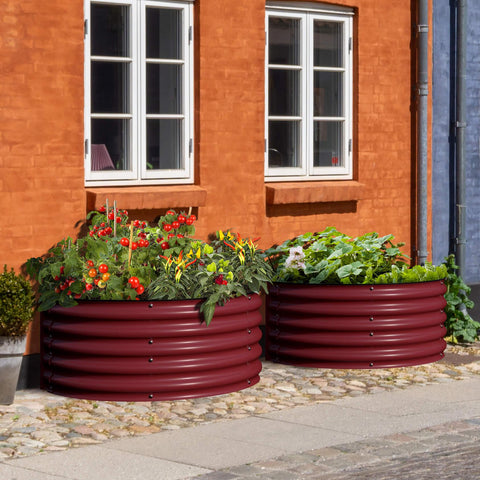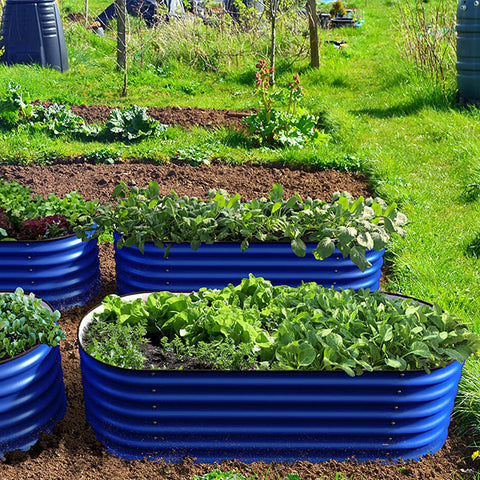Knowledge from Olle Garden Bed: 5 Plants That Don't Like Coffee Grounds
For a long time, coffee grounds have been touted as a valuable supplement to garden soil, providing essential nutrients for plants and improving soil structure. However, not all plants like coffee grounds. That's why knowing which plants don't like coffee grounds can help you avoid damaging them and keep your garden thriving. This content also has some reference value for Olle Garden Beds.
Explore why some plants can't get along with coffee grounds, and find a list of common plants that you need to stay away from a cup of coffee in the morning. Whether you are an experienced gardener or just starting, this information is valuable to ensure the health and success of plants.
Why do some plants dislike coffee grounds?
It is well known that coffee grounds can increase soil acidity because they contain high levels of nitrogen, phosphorus and potassium, which are essential nutrients for plant growth. The ph value of coffee grounds is between 6.5 and 6.8, making them slightly acidic.
When you add coffee grounds to the soil, they will decompose and release these nutrients and organic substances over time. This organic matter helps to maintain soil structure, improve water retention and promote the growth of beneficial microorganisms.
Although this is beneficial to acid-loving plants, it may be harmful to plants that do not tolerate acid soil. In addition, too acidic soil will reduce the availability of essential nutrients for plants that cannot adapt well to acidic conditions.
In addition, the high nitrogen content in coffee grounds will lead to excessive stimulation of leaf growth at the expense of flowering and fruit. Therefore, before adding them to your garden, please study the specific needs of plants and provide appropriate soil conditions and nutrients to keep them healthy and happy.
5 plants that don't like coffee grounds
Rose
Rose is a beautiful and popular plant with specific soil requirements to achieve optimal growth and health. They prefer neutral to weakly alkaline soils with ph between 6.5 and 7.0. Too acidic soil will lead to slow growth, yellow leaves and reduced flowering.
Therefore, do not use coffee grounds in the soil around the roses. On the contrary, roses benefit from fertile soil with good drainage and rich organic matter. In order to maintain this soil condition, you can improve the soil with compost, rotten manure or other organic substances (such as eggshell) to improve the ph value.
Remember to test the soil ph regularly to ensure that it remains within the optimum range of roses.
Clove shrub
Clove bush is a beautiful and fragrant plant, which is the staple food of many gardens. In order to plant healthy and healthy cloves, please provide them with soil that meets their specific requirements. Clove flower likes neutral to slightly alkaline soil with ph value around 7.0.
Like other plants that prefer neutral or slightly alkaline soil, lilac cannot benefit from coffee grounds added to the soil. Instead of helping them thrive, coffee grounds will disrupt the optimal growth of cloves.
MUMS
MUMS, also known as chrysanthemum, is a popular autumn flowering perennial plant, adding color and texture to the garden and landscape. In order to cultivate healthy and healthy MUMS, please provide them with well-drained soil with ph value between 6.0 and 7.0.
Adding coffee grounds to the soil is not good for mothers. The slight acidity of coffee grounds will reduce the ph balance of the soil and make it more acidic. This change in soil acidity will have a negative impact on MUMS. However, with proper soil care, they can thrive and produce a large number of colorful and lasting flowers every autumn.
Garlic
Garlic is a favorite delicious herb and a multifunctional crop. You can plant it in various soil types. In order to give full play to its potential, it needs well-drained soil and maintain a neutral ph balance between 6.0 and 7.0. Unfortunately, too acidic or too alkaline soil will have a negative impact on the growth and taste of garlic bulbs.
On the other hand, coffee grounds, although slightly acidic, have no special advantages over garlic. Adding coffee grounds to the soil can change the ph balance, which may be harmful to plants because it thrives in neutral soil conditions.
Lemon
Lemon, with its bright and rich flavor, is the favorite fruit of many people. In order to plant a happy and healthy lemon tree, the right soil is the key. They like well-drained soil with ph between 6.0 and 7.0. It allows the roots to absorb the nutrients needed to grow strong and produce juicy lemons.
Adding coffee grounds to the soil will cause the ph value to drop too much, making the soil too acidic, and the lemon tree can not thrive. By avoiding coffee grounds and providing suitable soil conditions, your lemon tree can grow tall and strong and produce juicy lemons.
Sage brush
Sage is a cold-resistant shrub native to western North America, which can tolerate alkaline soil with ph value up to 8.5. It likes well-drained soil and can grow in various soil types, including sandy, loamy and clay.
Salvia will not benefit from adding coffee grounds to the soil. Adding them to alkaline soil will further increase its acidity, making it less suitable for sage.
Russian sage
Russian sage is a cold-resistant perennial plant native to Central Asia, which can tolerate various soil conditions. It likes well-drained soil, with ph value higher than 7.0, less organic content, and can grow in soil types from sandy to clay.
However, because it prefers alkaline soil, adding coffee grounds will not benefit. Adding them to the soil will reduce its ph value and make it less popular with Russian sage.
No coffee for you!
Adding coffee grounds to the soil will have a positive and negative impact on your garden. Although some plants benefit from additional nitrogen and slightly acidic ph value, other plants cannot tolerate acidic soil, and coffee grounds will harm them.
This is why it is important to understand the soil requirements of each plant to ensure that all your plants can obtain the nutrients needed for healthy and strong growth. By understanding the impact of coffee grounds on plants, you can create a prosperous and diverse garden and provide beauty and enjoyment in the next few years.


